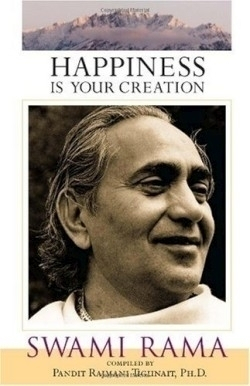
Happiness Is Your Creation
Compiled by Pandit Rajmani Tigunait, Ph.D.
- 2005 INDIES Finalist
- Finalist, Philosophy (Adult Nonfiction)
“His name is Swami Rama … my master, my guide who filled my heart with the conviction that happiness is the only wealth worth acquiring,” reads this book’s introduction, demonstrating the obvious affection and respect that the editor harbors for his teacher. The Swami’s overall message is simple: happiness is not found in possessions or relationships, but only in a properly ordered mind. Surprisingly, the remainder of the book discloses an idiosyncratic, even controversial worldview, the particulars of which will inspire some readers and repel others. Even those who disagree with Rama, however, will be provoked to greater thoughtfulness by his ideas.
A native of India, Rama was raised from an early age by a Himalayan spiritual master. After coming to the United States in 1969, he founded the Himalayan International Institute of Yoga Science and Philosophy of the U.S.A. in 1971. In this book, his protégé and successor has collected five essays that Rama wrote shortly before his death in 1996. Tigunait holds two doctorates, lectures and teaches worldwide, and has written twelve books, including Seven Systems of Indian Philosophy and Living Tantra, a series of audio books about Tantric and Vedic traditions.
Here, Rama stresses the importance of mental focus in his first two essays, “Living with Purpose” and “Cultivating a Quiet Mind.” His method for purifying the mind from encumbrances like desire, attachment, and fear is called “raja yoga,” but lest his Western readers mistake this yoga for the brand practiced at their local health clubs, Rama clarifies, “Today, I see so many people teaching and practicing yoga. Most of it, in my opinion, is a joke.” He asserts that most of today’s yoga is, by and large, devoid of the physical and spiritual benefits so essential to the practice of raja yoga.
While all five essays are well written and engaging, the third one, “Unveiling the Mystery of the Mind,” is the most organized. It explains the vital importance of mental discipline to spiritual and physical health, it proceeds to explain the components of the mind and their functions, according to Rama’s view. Provocatively, he closes by asserting that his readers should “leave the external crutches such as astrology, temples, mosques, churches, pundits, and swamis behind and seek peace and purpose within themselves.”
The last two pieces, “Happiness Is Your Creation” and “Happy Forever,” detail several spiritual dead-ends taken by people seeking happiness. Rama then encourages his readers to “throw away the crutches that perpetuate your dependency on others and create a world of your choice—a world that is happy and peaceful.”
Practitioners of New Age and Eastern spirituality will surely appreciate Rama’s insights. Readers from other faiths will see their most cherished beliefs challenged, not reinforced. Any reader, however, looking to be moved to greater holiness, compassion, and humility will find ample fodder for reflection.
Disclosure: This article is not an endorsement, but a review. The publisher of this book provided free copies of the book to have their book reviewed by a professional reviewer. No fee was paid by the publisher for this review. Foreword Reviews only recommends books that we love. Foreword Magazine, Inc. is disclosing this in accordance with the Federal Trade Commission’s 16 CFR, Part 255.
